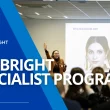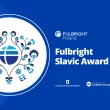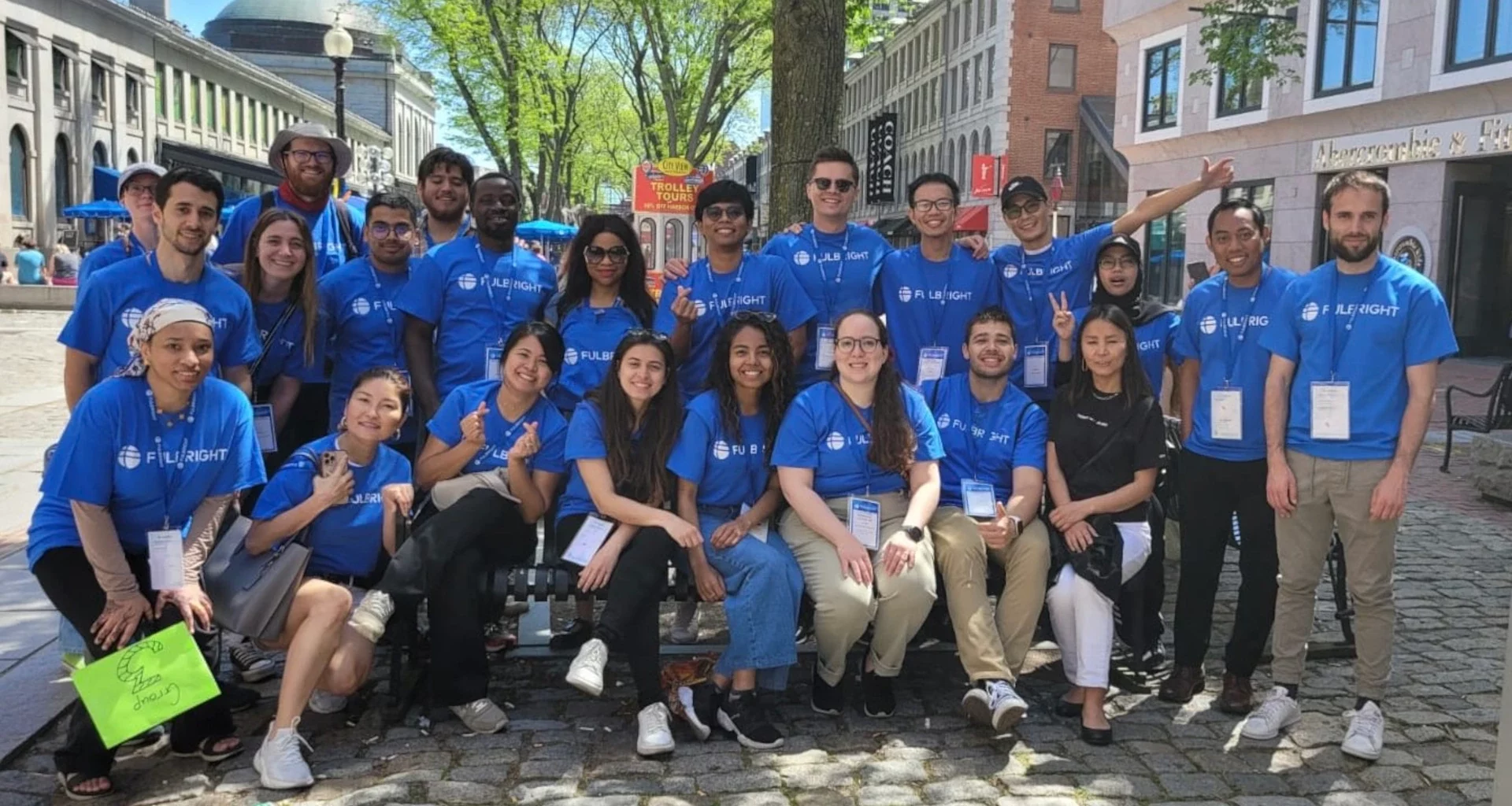What’s a Fulbright grant
The Fulbright Program has two dimensions. The first one is purely practical: we finance the study visits of Polish students, researchers and academic teachers to the U.S. and support their promising projects. The other one is ideological: we believe that the exchange of knowledge and skills serves an even greater purpose than the advancement of learning. According to the vision of the initiator of the Program, the American Senator J. William Fulbright, it is a tool for building dialogue and peaceful relations between nations. By bringing together the academic circles of different countries, we bring together whole societies.
Since the program works in two directions, U.S. researchers and experts have the opportunity to study or teach in Poland. As a result, many Polish academic and educational institutions, as well as non-governmental organizations, have the chance to invite specialists and lecturers from the U.S. to work with them on their projects.
General requirements for a Fulbright Poland grant
- Polish citizenship. Dual Polish-American citizens, U.S. Green Card holders, or individuals who reside in the U.S. at the time of application are ineligible to apply
- Meeting formal requirements of a J-1 visa
- Academic excellence
- Justified need to study, conduct a research and/or teaching project in the U.S.
- Preference is given to candidates who have not had any substantial recent experience in the U.S.
All Fulbright Poland grants include
- J-1 visa for the grantee issued free of charge
- Travel allowance for a round trip to the U.S. (1500 USD), for both the grantee and their dependents
- Health care coverage for the duration of the grant: Accident and Sickness Program for Exchanges (ASPE) and partial reimbursement of additional medical insurance costs
- Stipend to cover living expenses. The stipend rate is calculated based on the living costs estimated for the specific location by the Institute of International Education
- Allowances. Depending on the program, additional allowances are offered such as relocation and settling-in allowance, research, book and conference allowance or family allowance
- Support. The Commission helps the grantees prepare for their stay in the U.S. while the Institute of International Education (IIE) ensures they receive on-going support over the course of the grant
- Accessibility. The Commission provides appropriate forms of assistance and support to persons with disabilities including specific organizational advice, ensuring access to information and communication and forwarding special needs’ requests to host institutions. Persons with disabilities may also receive additional financial support.
Fulbright Foreign Student Program
Fulbright Graduate Student Award
- Who can apply: candidates must hold a second-cycle or long-cycle “magister” degree (English: master’s) or its equivalent at the time of application or will be awarded the degree by June of the grant year at the latest. Applicants should justify the fit of the studies in the U.S. with their academic and professional plans after returning to Poland. There is no age limit for this award.
- The Commission welcomes applications from all candidates regardless of race, ethnicity, national origin, gender identity and expression, sexual orientation, age, religion, geographic location, represented institutions and disciplines, socio-economic status, and ability.
- Aim of the grant: graduate studies at any accredited American institution of higher education.
- Apply for this grant before submitting application to a graduate school.
- Candidates for the award can choose between two placement tracks – with the support of IIE (IIE-Placed) or without the support of IIE (Self-Placed).
- Applications are accepted in all fields of study, except for medical studies requiring direct contact with patients, LLM (Master of Laws) – except for Graduate Student Award LLM in International Human Rights Law at University of Notre Dame, and MBA (Master of Business Administration) programs.
- Duration: 1 academic year (9-10 months) with a possibility of a renewal for the second year.
- The grant of up to 47,000 USD is for the cost of the first year of study. The grant total depends on the location of grantee’s host institution, grantee’s financial needs and available funds.
- Within the scope of the Graduate Student Award, candidates may choose to apply for a one-year Graduate Student Award LLM in International Human Rights Law at University of Notre Dame.
Fulbright Junior Research Award
- Who can apply: persons preparing doctoral dissertations in Polish units authorized to confer doctoral degrees, and their dissertation will be completed no sooner than after returning from the grant.
- The Commission welcomes applications from all candidates regardless of race, ethnicity, national origin, gender identity and expression, sexual orientation, age, religion, geographic location, represented institutions and disciplines, socio-economic status, and ability.
- Aim of the grant: conduct a research project at any accredited institution of higher education in the U.S., non-profit research institute or NGO.
- Candidates are expected to include a letter of invitation from a prospective host institution in their grant application.
- Applications are accepted in all fields of study, except for projects that require direct patient contact.
- Duration: 4 to 10 months.
- Grantees have the Visiting Student Researcher status.
- Within the scope of the Junior Research Award, candidates may choose to apply for a 8 to 10-month Fulbright Research Award at Stanford University School of Medicine.
Fulbright Visiting Scholar Program
Fulbright Senior Award
- Who can apply: scholars who hold, at a minimum, a Ph.D. degree and are employed at higher education or research institutions in Poland.
- The Commission welcomes applications from all candidates regardless of race, ethnicity, national origin, gender identity and expression, sexual orientation, age, religion, geographic location, represented institutions and disciplines, socio-economic status, and ability.
- Aim of the grant: conduct a research or research and teaching project at any accredited institution of higher education in the U.S., non-profit research institute or approved government institution.
- Applications are accepted in all fields of study, except for projects that require direct patient contact.
- Duration: 3 to 10 months.
- Candidates are expected to include a letter of invitation from a prospective host institution in their grant application.
Fulbright Slavic Award
- Who can apply: scholars who specialize in Slavic studies or related fields, hold, at a minimum, a Ph.D. degree, are employed as lecturers at higher education or research institutions in Poland, and have appropriate teaching experience.
- The Commission welcomes applications from all candidates regardless of race, ethnicity, national origin, gender identity and expression, sexual orientation, age, religion, geographic location, represented institutions and disciplines, socio-economic status, and ability.
- Aim of the grant: scholar’s primary responsibility is to teach undergraduate or graduate courses in the field of Slavic studies according to the needs specified by a higher education institution in the U.S.. Besides teaching scholars can conduct other academic activities, such as guest lectures, departmental or interdisciplinary program seminars or collaborative research with faculty or staff.
- Duration: one semester.
Fulbright STEM Impact Award
- Who can apply: STEM-field researchers who hold, at a minimum, a Ph.D. degree, are employed at higher education or research institutions in Poland, manage research projects and have a supervisory role over other researchers.
- The Commission welcomes applications from all candidates regardless of race, ethnicity, national origin, gender identity and expression, sexual orientation, age, religion, geographic location, represented institutions and disciplines, socio-economic status, and ability.
- Aim of the grant is two-fold: 1) to share one’s expertise in relevant field by giving lectures/seminars/workshops and/or developing curricula, training materials etc., and/or conduct research (individually or by joining host institution’s team/project in progress); and 2) to learn about the organizational and funding systems of U.S. scientific institutions, the commercialization of science and development of successful grant applications.
- The grant can be realized an accredited U.S. higher education institution, non-for-profit research institute or other approved non-commercial institution in the U.S.
- Duration: 2-6 weeks.
- Candidates are expected to include a letter of invitation from a prospective host institution and a detailed list of grant activities in their grant application.
Fulbright Scholar-in-Residence Award
- Who can apply: scholars, who hold, at a minimum, a Ph.D. degree and are employed at higher education or research institutions in Poland.
- The Commission welcomes applications from all candidates regardless of race, ethnicity, national origin, gender identity and expression, sexual orientation, age, religion, geographic location, represented institutions and disciplines, socio-economic status, and ability.
- Aim of the grant: grantee conducts lectures and performs other engagements agreed upon with the host institution and, optionally, his/her own research project at a minority-serving institution, community college, small liberal arts college or rural college/university in the U.S.
- Duration: 3 to 9 months.






